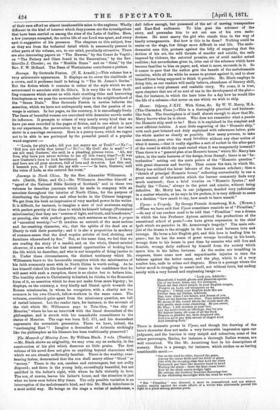Journeys in North China. By the Rev. Alexander Williamson. 2
vols. (Smith, Elder, and Co.)—Mr. Williamson describes himself as "agent of the National Bible Society of Scotland," and in these two volumes he describes journeys which he made in company with an associate throughout the interior of North China, for the purpose of distributing the Scriptures and other books in the Chinese language. We get from his book no impression of very marked power in the writer. It is difficult, for instance, to imagine a man of real acuteness saying with perfect gravity of the class to which he himself belongs (Protestant missionaries) that they are " centres of light, and truth, and beneficence," or penning, also with perfect gravity, such sentences as these, a propos of "ancestral worship:"—"It involves an untruth of the most serious and far-reaching character, viz., that the spirits of the dead are at liberty to visit their posterity ; and it is also a proposition in mockery of common-sense that the dead require articles of food, clothing, and furniture etherealized by fire." But, at the same time, we feel that we are reading the story of a candid, and, on the whole, liberal-minded observer, of a man who has had unusual opportunities of looking into the life which he describes, and who is not incapable of doing justice to it. Under these circumstances, the distinct testimony which Mr. Williamson bears to the favourable reception which the missionaries of his faith commonly meet with in North China is worth noting. As he has himself risked his life hundreds of times in the confidence that he will meet with such a reception, there is no choice but to believe him. The hostility shown to Christianity is limited, he thinks, to the Romanist form of it, an assertion which he does not make from mere bigotry ; he displays, on the contrary, a very kindly and liberal spirit towards the Roman missionaries, in whom he recognizes, with a charity not too common in his own Church, fellow-workers in the same cause. The volumes, considered quite apart from the missionary question, are full of varied interest. Let the reader turn, for instance, to the account of the visit which Mr. Williamson pays to Tsin-hien, " the city of Mencius," where he has an interview with the lineal descendant of the philosopher, and is struck with his remarkable resemblance to the statue of Mencius. The sage was born B.C. 371, and his descendant represents the seventieth generation. There we have, indeed, the "unchanging East "! Imagine a descendant of Aristotle strikingly like the philosopher as his likeness has been traditionally preserved !


































 Previous page
Previous page